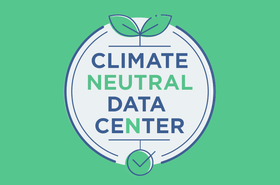This week, President Biden signed the US back into the Paris climate accord, rejoining nearly 200 countries in the landmark 2015 agreement which promised to limit the world's climate change to 2C - or 1.5C if possible. With the Paris accord back in the headlines, now's a good time to assess the prospects of achieving that.
The new US administration is making it clear that climate change is a global problem, which can only be transformed by global action: "Reaching net-zero global carbon emissions as early as 2050 will take a wholesale transformation of the global economy,” said John Kerry, the man Biden appointed as Special Envoy for Climate.
As Biden signed his executive order to rejoin the Paris accord, you might be wondering what form global action will take. On that same day, an announcement from Europe gave some pointers. It's clear that this goes beyond any one nation, organization or sector. But it seems that the digital economy is going to take a leading role.
Climate-neutral by 2030
This week, 25 European cloud providers and 17 trade bodies signed a pledge to go climate neutral by 2030. We've heard plenty of announcements from individual providers, but this one is different, because multiple vendors are signing up to the same promise. It's also different because it's part of Europe's overarching plan, which is nothing less than getting the whole continent climate-neutral.
The EU's Green Deal, announced in late 2019, might turn out to be a template for how regions can start the co-operation needed to get emissions under control. It's got a budget in the trillions of euros, and one of its first moves was to get the data center sector on side.
Data centers are becoming a major energy consumer. But they also enable other sectors to decarbonize, by enabling things like smart cities and teleconferencing. They are also in a fortunate position with regard to their own sustainability: unlike a lot of other sectors, data centers are on a rapidly advancing technology trajectory.
What that means is that data centers get to have their cake and eat it: they can increase their efficiency, and reduce their own emissions while supporting a massive growth curve. As a recent IEA report said, the Internet has increased 12 fold in the last 10 years, while data center emissions have crept up by a only few percent.
So far, so good. But if we look at the Pact's targets, it becomes clear that data centers have a fair amount of work to do, to ensure they have a self-regulation program that will stand the science-based scrutiny of EU Vice President Frans Timmerman.
As well as increasing efficiency and shifting to carbon-free power, data centers will have to look at other aspects of their impact, including their impact through the business ecosystem.
So water conservation is in the mix - though it is to the data center industry's shame that there are still no really good usable metrics for this. It is, after all, fully ten years since the Green Grid launched Water Usage Effectiveness (WUE). That metric is pretty much unused, and the Pact tacitly admits it may turn out to be unusable, with its promise to use WUE "or another water conservation metric," which won't be decided till 2022.
Reuse and repair of servers is likewise a big nettle to grasp. It's obviously needed, but also runs counter to the business model of IT vendors who want you to rip and replace regularly. And it's clear that circular-economy pioneers like ITRenew are still at an early stage, with only a tiny penetration for the second-hand servers they repurpose from hyperscalers like Facebook.
Reusing waste heat is likely to remain an aspiration for most. Even if you're in the appropriate climate, warm air can't be transported, and data centers don't produce it at a high enough temperature to make it really appealing unless you have a district heating system on your doorstep.
PUE, the cornerstone of all data center efficiency work so far, is good enough to support fair and concrete targets. But even PUE looks a tad tired, and complex to administrate in the fierce light of government scrutiny. The pact says: "In recognition of the European Commission’s interest in creating a new efficiency metric, trade associations will work with the appropriate agencies or organizations toward the creation of a new data center efficiency metric."
Facebook and Microsoft are ignoring all this - perhaps feeling that signing up to other people's targets will never look as good as creating their own. But, as we said before, no-one can fix this problem alone.
Data centers need to clean up their act, and act smart, if only because the whole economy needs their intelligence to make the rest of society climate neutral. And within the data center industry, the move to become climate neutral needs everyone on-side.
The whole idea of a climate-neutral continent could be a game-changer because it's much easier to be climate neutral when the whole of your supply chain is working with you. Right now, to be properly climate neutral, you have to account for "Scope 3" emissions from your suppliers. But, as Equinix's Michael Winterson told me, if everyone is moving to climate neutrality, that issue could eventually go away: "Philosophically, Scope 3 shouldn’t matter if you have an entirely climate-neutral continent. If I buy concrete it should already be climate neutral. Scope 3 should disappear."
No one can fix climate change on their own. That goes for countries, companies, and consumers - much as I'd like to believe that we can save the world by refusing a plastic bag at the shops. I for one will pay a lot more attention to a provider that signs up to a multi-national scheme with proper scrutiny, than one that claims to be a standalone hero.





